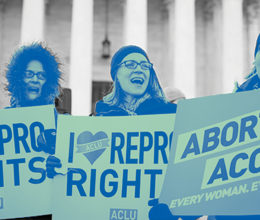
Despite the tremendous progress made in the struggle for gender equality, women still face violence, discrimination, and institutional barriers to equal participation in society.
Reproductive freedom is key to gender equality. When a woman is free to make her own personal decisions about contraception, pregnancy, and abortion, she can participate equally in the social, economic, and political spheres. The ACLU’s work in Roe v. Wade and its landmark Massachusetts counterpart Moe wasn’t the start – or the end – of our work to ensure reproductive freedom and gender equality. Since then, the ACLU of Massachusetts has been in the courtroom and on Beacon Hill, fighting to ensure that every woman can make the best health decisions for herself and her family without undue political interference.
In the workplace, a range of barriers prevents women from having an equal opportunity to succeed in their jobs. The ACLU stands up for pregnant and nursing employees, and we work towards closing the gender wage gap. In 2018, we advocated for paid family and medical leave, which is critical to achieving economic equality for women who too often have to choose between the job they need and the family they love.
Transgender men and women, too, face gender-based barriers to full safety and equality. As a leading member of the Freedom For All Massachusetts coalition, the ACLU of Massachusetts worked to pass legislation in 2016 to protect transgender people from discrimination in public places. Now, the coalition is working to defend these basic protections for transgender people at the ballot box in November 2018. These protections are especially important for trans women of color, who are disproportionately impacted by anti-transgender discrimination and violence.
The ACLU of Massachusetts is committed to ensuring equal economic opportunities, educational equity, and an end to gender-based violence.


